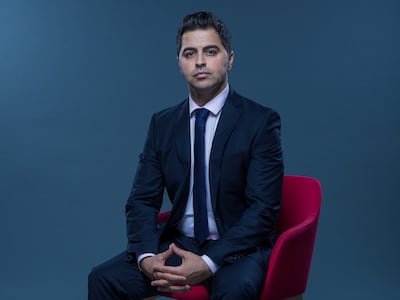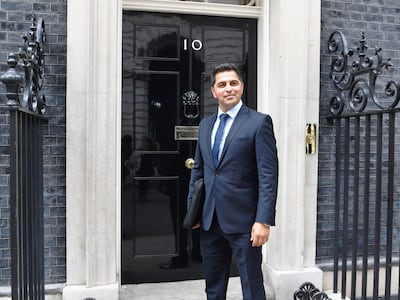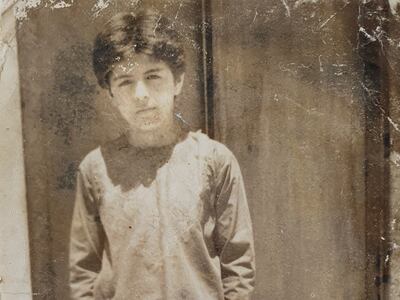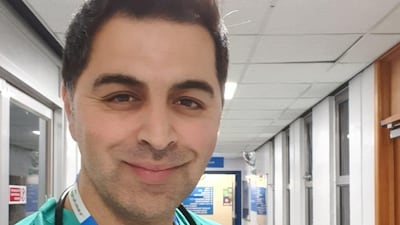As Nato powers continue to grapple with chaotic evacuations from Afghanistan and their governments thrash out resettlement plans, the human cost of international political failure is shaping up to be high.
British-Afghan radiologist and former refugee Dr Waheed Arian can sense the dangers ahead but also knows more than most about the transformative power of safety and opportunity. He is calling on the UK to treat his compatriots with the same "kindness and compassion" he received as a child escaping war a generation ago.
A graduate of Cambridge and Harvard universities, Dr Arian arrived in Britain aged 15 as an unaccompanied child refugee in 1999 after his parents sold everything to pay for their son’s escape from Taliban rule brought about by a protracted civil war. The practising medic set up the charity Arian Teleheal, which connects doctors in the UK with health workers in conflict zones, including Afghanistan.

Alone with only $100 in his pocket and a patchy formal education, he worked in menial jobs while attending evening college where he gained five A-grade A-Levels and a place at one of the world’s most prestigious universities.
His memoir In the Wars is an exceptional story of success against the odds but he says there are many others with dreams like his who need immediate support. The UK's offer of 20,000 relocation slots could be staggered for too long, he says.
“Afghans are fleeing for their lives, they can't wait two to five years, they need support now,” Dr Arian tells The National. “Those numbers need to be increased and the routes for people to be able to resettle have to be expedited or more streamlined."
Those who seek refuge through informal or irregular routes should, he says, be met with compassion, not criminalisation, as would be the case under the UK’s Nationality and Borders Bill.
“When they arrive on our shores we have to give them safety which is a human right, unconditionally," he says. "We have to look them in the eyes as human beings. They are people just like myself when I came in with false documents, when I came in as a 15-year-old traumatised child with no family.
"But deep down I did have it in me to do something with my life and later on to give back,” says the emergency doctor who now lives in Chester, north-west England.

“We have to look at them as people with dreams, as people who would give back to society … we shouldn't criminalise them, we shouldn't demonise them. That's all I'm asking from the UK government and the rest of the world.”
A continuous conflict: Afghanistan’s early wars
Speaking to The National in the days after the fall of President Ashraf Ghani’s government to the Taliban, Dr Arian admits that witnessing the return of the hard-line regime, the violence and the fear, has been mentally and emotionally taxing.
“I was born in war-torn Afghanistan where I spent the first 16 years of my life. So it has all been very triggering for the past traumatic memories that I have of genocide. And for many other Afghans who have experienced conflict, they remember the same. That's why they're wary, they're tired. Afghans are physically and mentally absolutely traumatised by all this,” he says.
Dr Arian, 38, was born in 1983, four years into the nine-year Afghanistan-Soviet war. Conflict was the only constant of his childhood, the first years of which were spent hiding in cellars to escape the raining bombs and shells. Eventually, the family made a perilous journey through valleys on donkeys to neighbouring Pakistan, miraculously circumventing repeated insurgent attacks along the way before settling in refugee camps. Safe from the weapons of war, he nonetheless describes the conditions in the camps as no less life-threatening.
“We had one tent for a family of eight, later on 10. Then that tent was upgraded to a muddy room with one fan, temperatures rising up to 45°C. Most of us contracted malaria within three months, I started coughing and soon I was even bringing up blood and I turned into a skeleton because I'd lost so much weight,” he says, describing what would eventually be diagnosed as tuberculosis by a doctor at the camp.

Despite being given a 70 per cent chance of survival, the young boy made a full recovery and, grateful to the man who saved his life, was inspired to become a doctor.
“I wanted to do something to become something like him, so I could heal other the traumas of other people.”
The trauma of war
Dr Arian is all too aware of the trauma of war. They are “cards” he unwittingly brought with him to the UK and he has suffered from PTSD, anxiety and depression. Mental health is “close to his heart” and forms the reason why he set up Arian Well-Being, an offshoot of his charity. He hopes to share some of the coping mechanisms he used both as a child of war and a traumatised refugee.
After the Afghanistan-Soviet war ended in 1990 the family returned home from Pakistan only to be confronted two years later by a civil war that would eventually shepherd in six years of Taliban rule.
Twenty years after US forces overthrew them in 2001, the group’s resurgence to power has brought back painful memories for many Afghans like Dr Arian who tells me he “burst out crying” as soon as he heard the government had fallen.
“One of the main reasons for that was it because I remembered exactly that day in 1992, how the whole situation unfolded. We immediately started hearing firing, we started seeing bullets flying. We ran out of our house, children, the whole family. And we were crawling through gutters, dodging bullets, the bombs, overstepping dead bodies, hiding ourselves for the next four years,” he says.
Grimly aware of the horrors that may yet unfold in his home country, Dr Arian has spent the past week making many impassioned pleas for immediate international support to help with a looming humanitarian crisis.
He wants the world to see refugees as givers, like himself, not takers. Like other NHS frontline workers, he has spent the past 18 months trying to heal and save people from the ravages of Covid-19. This week he was nominated by the UK daily newspaper The Sun as one of its ‘NHS heroes’, a distinction he dedicated to “the people of Afghanistan” on Twitter.
“Refugees are not just numbers, they're not just another boat," he says. "They are human beings with dreams with families, with sisters, brothers, same as I do. And they're equally talented. But the difference is that I was lucky to get out, I was lucky to benefit from these opportunities and many people are not.”


